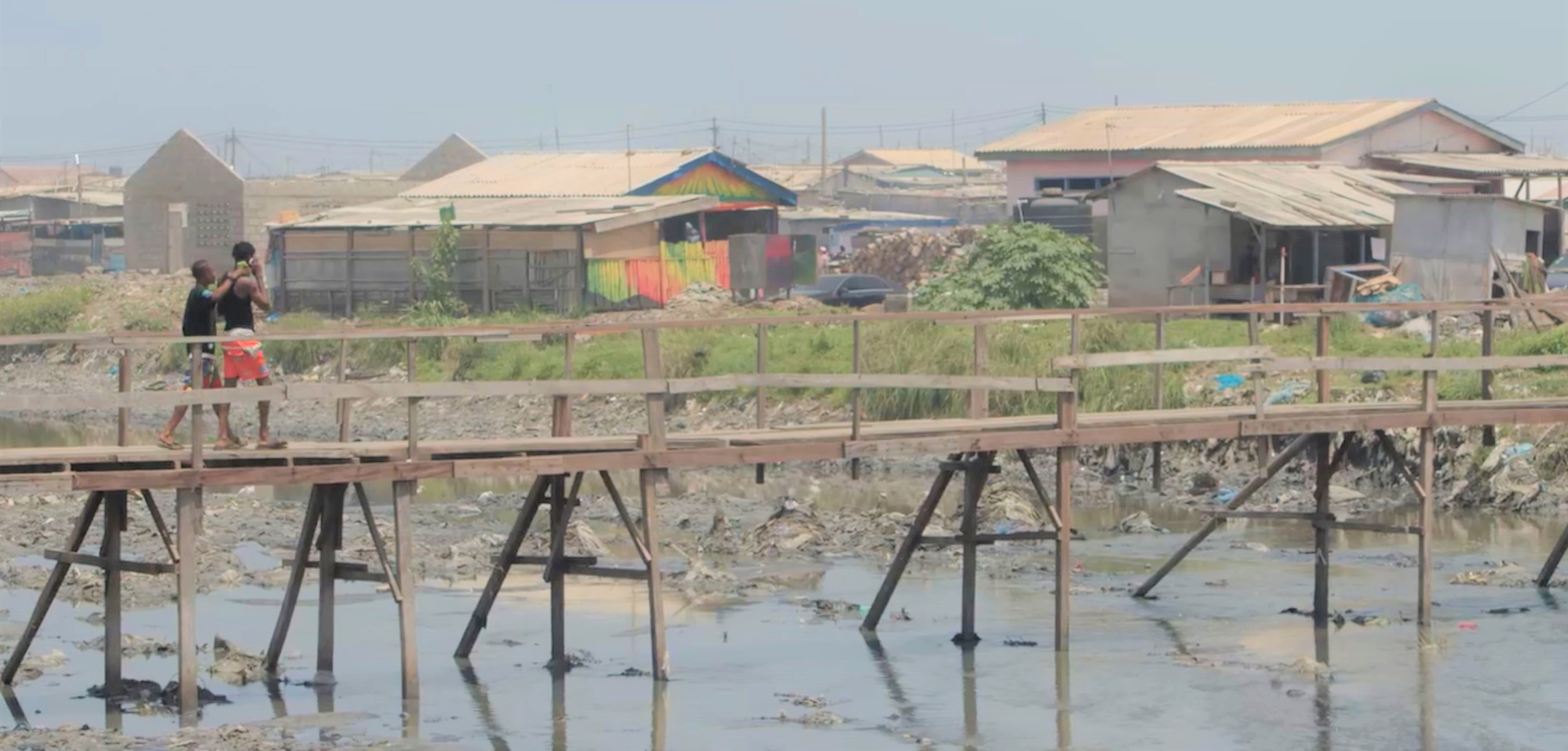Towards zero poverty: Dignity for all in practice
October 17, 2022

Chorkor- a slum community in Accra recently served with health facilities by UNDP with support from the Government of Japan.
Today, 17th October marks the International Day for the Eradication of Poverty. This Day ‘honors’ the millions of people suffering from poverty and their daily courage and recognizes the essential global solidarity and shared responsibility we hold to eradicate poverty and combat all forms of discrimination.
The 2030 Agenda for Sustainable Development envisions a world with ‘no poverty’ where ‘no one is left behind.’ A world of “universal respect for human rights and human dignity, the rule of law, justice, equality and non-discrimination.” Yet, after 7 years of its implementation we still have more than 10 percent of the world population in extreme poverty. A majority of the world’s poor live in Middle Income Countries. They have limited access to basic needs like food, water, shelter, healthcare, and adequate housing.
This highlights the multidimensional nature of poverty; it goes beyond a lack of income. Poverty is about gaps in the basic capabilities required to live in dignity. People living in poverty, especially those in extreme poverty, constantly face instances of their dignity being denied and disrespected.
This is why “Dignity for all in practice”, the theme for this year’s Day for the Eradication of Poverty is not only timely but is extremely important. Recognizing that poverty is not solely an economic issue and that “dignity” is not an abstract concept is vital. Dignity belongs to each and everyone. Dignity constitutes the basis of all other fundamental rights and should be at the heart of every poverty eradication initiative.
End poverty through justice, peace and a healthy planet
Social justice – People living in poverty are often denied access to basic human rights such as the right to education, food, shelter, healthcare, adequate housing. Women, people with disabilities and those from minority communities form a good number of poor people who face the added burden of discrimination and unfair treatment.
Peace - People living in poverty are often trapped because they are excluded from the rest of society, denied a say, and threatened with violence and insecurity.
Planet – Majority of poor people worldwide live in slums or informal settlements with lack of access to clean water and basic toilets. With the climate emergency, “people living in poverty are unduly burdened by more frequent occurrences of natural disasters and environmental degradation, leading to the destruction of their homes, crops and livelihoods”.
Eliminating indignity in all dimensions - social justice, peace and planet requires a whole-of-government and whole-of-society approach. We need to increase investment and partnership to advance rights protection, empowerment, and solidarity in addressing human security, planetary considerations and human development.
Enhancing dignity in practice through solidarity
There are some good examples of integrated programmes towards dignity and poverty eradication. For instance, UNDP is ‘investing in the enhanced capabilities people need to move above the poverty line and keep moving forward’. By putting people at the centre of development, our programmes demonstrate that sustainable development is about dignity for all. Sustainable development in practice is about advancing people’s prosperity within planetary boundaries – people at peace with people and the planet.
Closing the poverty gap and reducing inequalities requires a conscious effort in identifying who is being left behind and why they are being left behind. Through collective intelligence and co-creating solutions we can help to address the root causes of persistent poverty. UNDP in Ghana is making deliberate efforts to empower those being left behind. The story of Yakubu Issakah, a person living with mental health disability benefitting from a solar irrigation farming project is a good example. “I was just sitting idle at the mercy of others but now I am happy to be busy for a good cause”, says Yakubu.
Similarly, under the UNDP/GEF Small Grant Programme, more than 1200 farmers are currently engaged in combining fish farming with vegetable and crop cultivation, thus creating jobs, improving incomes and nutrition and ensuring environmental sustainability.
In another example, UNDP in Ghana is helping to empower and build resilience of women in the shea value chain by providing them with machinery to automate the hitherto labour-intensive processes. The projects help women increase their productivity while saving time, increase their earnings and promote sustainable livelihoods. The machines also help them reduce exposure to toxic smoke which is good for their health and limits significant wood and water consumption, protecting the environment. In addition, the shea processing machinery are locally manufactured which helps stimulate the local economy.
Conclusion
To address the challenges of our time including eradication of poverty, governments and communities must work faster to ‘build forward better and smarter’ with dignity. To quote Nelson Mandela: “Overcoming poverty is not a gesture of charity. It is an act of justice. It is the protection of a fundamental human right, the right to dignity and a decent life. While poverty persists, there is no true freedom.”
Development with dignity in practice will ensure that all members of society lead decent, dignified, and rewarding lives in a safe and healthy environment both now and into the future.Angela Lusigi

 Locations
Locations